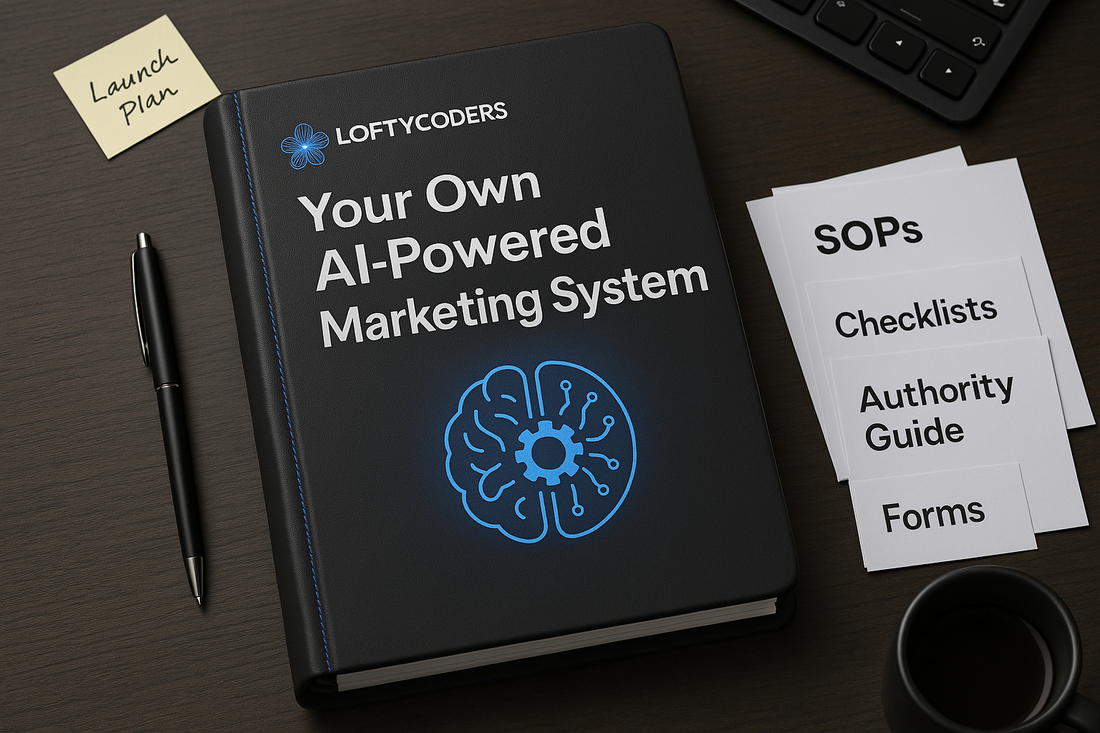
Why Your Marketing Isn’t Working (And How an AI-Powered System Can Fix It)
Share
You’ve hired a marketing team, set up ad campaigns, post consistently on social media, and send out emails—but sales are still unpredictable. Some months, customers roll in effortlessly. Other times, it feels like you’re throwing money into a black hole, hoping something sticks.
Sound familiar? If so, you’re not alone. Most businesses struggle with marketing not because they aren’t putting in effort, but because they don’t have a structured system.
Marketing, for many businesses, is a collection of disconnected activities—a mix of paid ads, content marketing, and email campaigns without a clear, unified process. This is where the real problem lies. A marketing department executes tasks, but a marketing system ensures predictable, scalable, and sustainable growth.
The Costly Mistake Most Businesses Make
Most businesses approach marketing like this:
- Hire an agency or a team to run Google and Facebook Ads.
- Post on Instagram and LinkedIn, hoping to build engagement.
- Create a few blogs and send out newsletters.
- Wait for sales to roll in.
But here’s the harsh reality—this approach is like pouring water into a leaky bucket. The effort is there, but most of it is wasted because:
- Leads aren’t nurtured properly—so most visitors never become customers.
- Ad budgets are burned quickly because there’s no optimization.
- Branding is not aligned with the customer persona, making it difficult for potential buyers to connect.
- Marketing efforts depend on team skills—if a key person leaves, results drop.
- No system exists to convert customers into brand advocates, leading to missed referral opportunities.
- No structured process for authority building, so customers don’t see the brand as an industry leader.
- Data isn’t analysed or used effectively, meaning decisions are often made based on assumptions rather than actual performance.
If your marketing operates like this, it’s not a matter of if you’ll struggle, but when.
The Shift: Why a Marketing System is the Future
Think of the biggest, most successful brands—Apple, Tesla, Amazon. Their success isn’t built on individual marketing campaigns but on a structured, AI-powered marketing system that ensures:
- Consistent lead flow—they never worry about running out of customers.
- Optimized spending—every marketing dollar is tracked and optimized.
- Automated engagement—emails, ads, and customer follow-ups happen without manual effort.
- Scalability—their marketing works whether they have 100 customers or 1 million.
Now, let’s bring this closer to home.
How a Marketing System Transformed a Business
Meet Sarah. She runs an eCommerce brand selling handmade jewellery. She was spending $5,000/month on ads, but her sales were all over the place. Some months, she made a profit. Other times, she barely broke even.
Her problem? She was relying on ads to generate sales but didn’t have a system to nurture and convert her leads.
What changed?
- We built her an AI-powered marketing system that captured leads, nurtured them through automated email and SMS sequences, and used AI to optimize her ad spend in real time.
- We implemented an automated referral program that turned happy customers into repeat buyers.
- We set up a data-driven content strategy to build brand authority and attract organic traffic.
The result?
- 34% increase in repeat customers within 3 months.
- 28% higher email open rates & click-through rates.
- Her business became profitable every single month—without relying on luck.
Sarah’s story isn’t unique. It’s the same transformation that happens when a business shifts from random marketing efforts to a structured system.
Why a Marketing Department is Not Enough
A marketing department executes campaigns, but a marketing system builds long-term, predictable growth.
| Aspect | Marketing Department | AI-Powered Marketing System |
|---|---|---|
| Focus | Running ads, social media, email | End-to-end customer journey automation |
| Scalability | Limited by team capacity | AI-driven, scales infinitely |
| Branding | Often misaligned with customer persona | Data-backed, personalized messaging |
| Data Usage | Basic tracking, mostly guesswork | AI-driven insights & decision-making |
| Cost Efficiency | High costs due to inefficiencies | Optimized for lower CAC & higher ROI |
| Customer Retention | Manual follow-ups (often inconsistent) | Automated, AI-powered engagement |
| Authority Building | No structured strategy | AI-driven PR & brand positioning |
| Word-of-Mouth Marketing | No amplification system | AI-automated referral and advocacy programs |
How You Can Implement a Marketing System in 3 Steps
If you’re wondering how to transition from scattered marketing efforts to an AI-powered marketing system, follow these three steps:
Step 1: Standardize Your Efforts
- Define clear customer personas—who are you selling to?
- Align branding & messaging across all marketing channels.
- Map out the customer journey (from first interaction to repeat purchase).
Stat: Businesses that standardize their marketing processes see a 313% higher success rate. (CoSchedule).
Step 2: Create a Feedback Loop
- Set up AI-powered analytics to track marketing performance.
- Use A/B testing to optimize ads, messaging, and offers.
- Implement automated reporting to improve data-driven decisions.
Stat: Businesses using AI-driven insights see a 30-50% increase in marketing ROI. (McKinsey).
Step 3: Automate & Scale with AI
- Automate lead generation—AI optimizes ad targeting & audience selection.
- Set up lead nurturing sequences—Automated email & SMS follow-ups.
- Use predictive analytics—AI forecasts sales trends and optimizes budgets.
Stat: Companies that fully automate their marketing scale 3X faster than those relying on manual efforts. (MIT Sloan Review).
Want to Get Your Own AI-Powered Marketing System?
We Can Help. We specialise in turning chaotic marketing efforts into structured, scalable AI-powered systems. Get rid of unpredictable sales, wasted budgets, and manual marketing tasks—it’s time to switch to an AI-powered marketing system that works 24/7, optimises itself, and scales effortlessly.
Stat: Businesses that implement AI marketing automation reduce customer acquisition costs by 50%. (Forrester Research).


